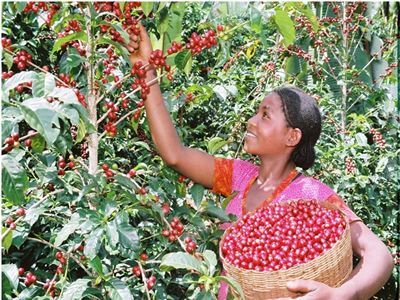
In recent years, Sub-Saharan Africa has experienced more frequent and intense climate extremes. Additional temperature increases have resulted in greater droughts, heatwaves, and raising the potential for crop failures. At the same time, heavier than usual rainfall during rainy seasons is destroying harvests and displacing communities. Climate change is negatively impacting crop yields and putting food security in Africa at further risk.
The following examples from Ethiopia and Uganda show that cooperatives are taking this seriously, and have a key role to play in securing livelihoods as well as helping to tackle climate change.
ETHIOPIA
Thanks to these changes in weather patterns, and also an increase in the activities of insect pests, coffee farmers in Oramia, Ethiopia, have been suffering reduced yields and lower quality in their crops.
To do their part to fight climate change, and to take long-term steps to protect coffee farms in Ethiopia, the Oromia Coffee Farmers’ Cooperative Union (OCFCU) began exploring how to improve efficiency while reducing environmental impact.
Coffee production itself generates CO2 emissions, which can contribute to climate change. To lower its carbon footprint, the cooperative started working with Fairtrade International on an energy efficiency project, which distributed energy-efficient cooking stoves to 20,000 local households. This enables households who rely on wood and charcoal stoves to perform the daily ritual of roasting coffee beans without releasing toxic fumes into the air.
In collaboration with Women Engage for a Common Future (WECF), ICA-Africa and other stakeholders, OCFCU also implemented a project to promote sustainable and decentralised energy technologies with a focus on gender equality. Access to affordable energy and clean water remains a challenge for many living in rural areas, with more than 22 million people still living below the poverty line in Ethiopia.
As part of the project, OCFCU members have received training to become energy and water ambassadors in their local communities. They are now working to raise awareness within their cooperatives and communities about how to plan, operate, maintain and sell energy technologies.
Cooperatives in both Oromia and Awach have also set up water and energy departments with the aim of creating a local energy network.
UGANDA
There has been an increase in heavy rainfall in parts of Uganda, forcing communities to face floods and landslides during the rainy season. This has been made even worse by the rapid loss of forest cover from trees being cut down for fuel. The heavy rains have also increased water levels in the lakes across the country, especially Lake Victoria, displacing communities living near the lake, who relied on fishing and agriculture. This is a huge threat to food security and will have a negative impact on the social and economic development of the area.
To mitigate the impact of climate change, the Uganda Cooperative Alliance (UCA) partnered with the National Forestry Authority (NFA) to plant over 50,000 trees per year, which will help to offset carbon emissions and reduce land erosion from heavy rainfalls.
The union has also worked with NFA to increase the capacity of its cooperatives to respond through training around the practice of agroforestry, adapting soil and water conservation technologies and supporting farmers to adopt energy saving technologies.
Savings and credit cooperatives are also contributing to the efforts to tackle climate change by forming partnerships with solar companies to provide favorable loans to their members for the development of solar projects. Energy cooperatives also distribute hydroelectricity from the National Grid to rural populations, helping reduce the reliance on wood and charcoal as a source of energy.




